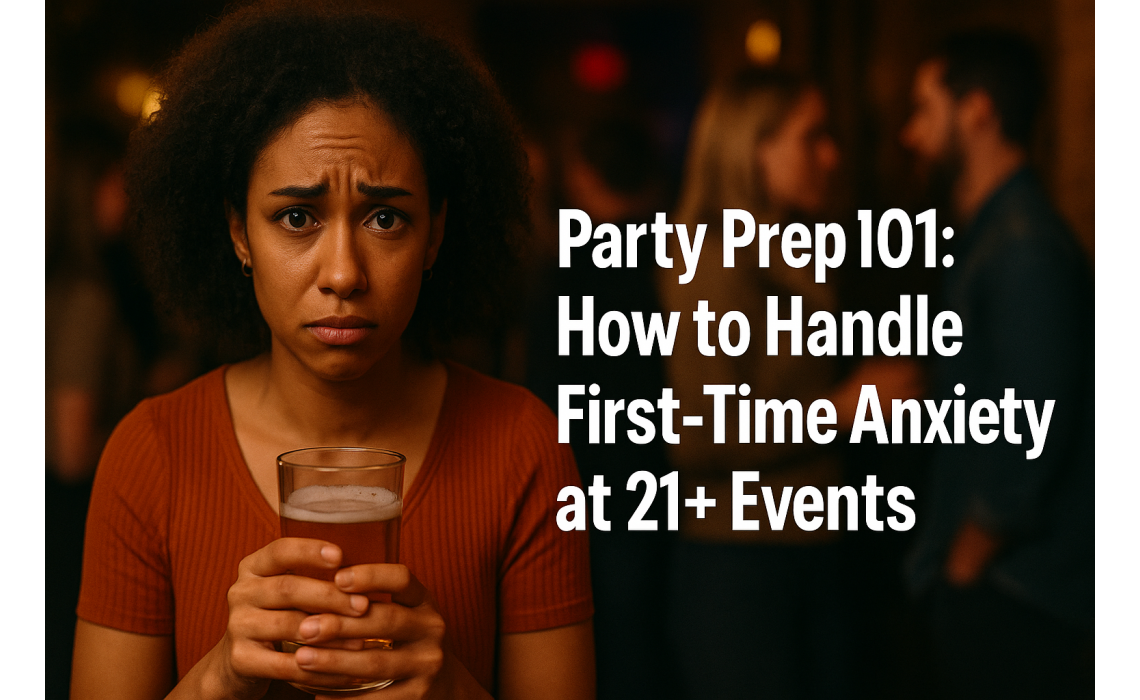Party Prep 101: How to Handle First-Time Anxiety at 21+ Events
Party Prep 101: How to Handle First-Time Anxiety at 21+ Events
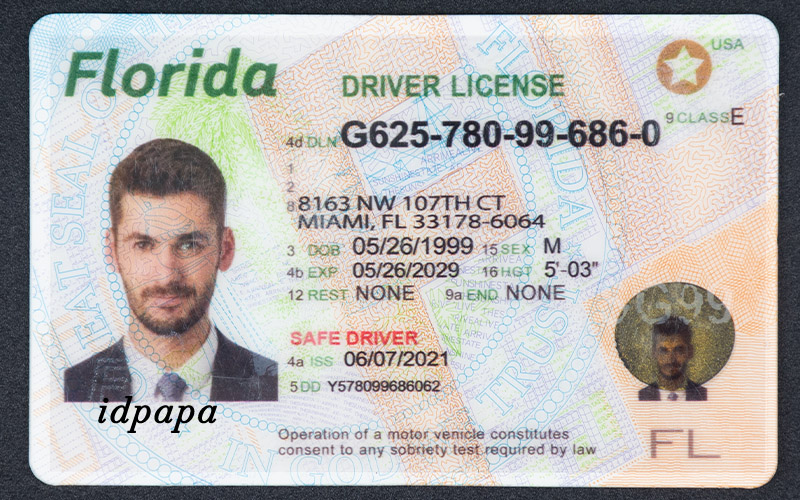
You just got invited to your first real 21+ party—maybe it’s a club downtown, a bar with live music, or a birthday bash in a private lounge. You should be thrilled… but instead, you feel nervous, maybe even a little out of place. Don’t worry—first-time anxiety at adult events is totally normal. You're not alone, and you're definitely not the only one who’s ever Googled "How to survive my first 21+ event without freaking out."
This guide will help you walk into that event with confidence, connect with people, and enjoy the night like a natural—even if you’re new to the scene.
1. Know Before You Go: Understand the Vibe
Before the big night, find out: Is it casual or dressy? What kind of music or crowd can you expect? Do you need to bring anything—like an ID, cover fee, or even a gift if it's a private event? These might seem like minor details, but knowing them ahead of time can significantly ease your nerves and help you feel more in control. Walking into a bar dressed for a nightclub, or showing up to a low-key lounge expecting a party, can throw off your entire mood and make you feel out of place before the night even starts.
Anxiety Hack: The more you know, the less you'll overthink. Doing a little prep work can go a long way. Ask your friends if they’ve been there before or check the venue’s social media for photos, dress codes, music genres, and crowd types. Look at tagged posts for a real, unfiltered preview of what you're walking into. It helps set expectations, reduces surprises, and gives you the mental head start you need to walk in with confidence. When you're mentally prepared, the whole night feels more natural—and way less intimidating.
2. Outfit = Confidence Booster
Wearing something you love—not just what you think will impress others—gives you a natural confidence boost. When you feel good in what you're wearing, it shows in your posture, your smile, and the way you carry yourself. You don’t need to follow every trend or mimic someone else's style to fit in. Confidence isn’t about being flashy—it’s about being comfortable in your own skin, and your outfit plays a huge role in that. You’ll blend in better and enjoy yourself more when you’re not constantly adjusting your clothes or second-guessing your look.
Make sure it’s comfortable, matches the event vibe, and feels like you. That means choosing clothing that you won’t be tugging at all night, something that aligns with the type of crowd you’re going to be around, and most importantly, something that expresses your personality. If you're going to a relaxed bar, that could be jeans and a fitted tee. If it’s a trendy club, maybe it’s a sleek jacket or statement piece. Either way, the goal is to walk in feeling like the best version of yourself—not a character you’re trying to play.
Bonus Tip: Always wear shoes you can stand in for hours. Painful heels or tight boots? Major mood killer. The last thing you want is to be limping around a packed venue or constantly looking for a seat because your feet hurt. Opt for stylish, reliable footwear that won’t hold you back from dancing, exploring, or just standing comfortably during long conversations. Your shoes can either carry you confidently through the night—or sabotage your whole experience. Choose wisely.
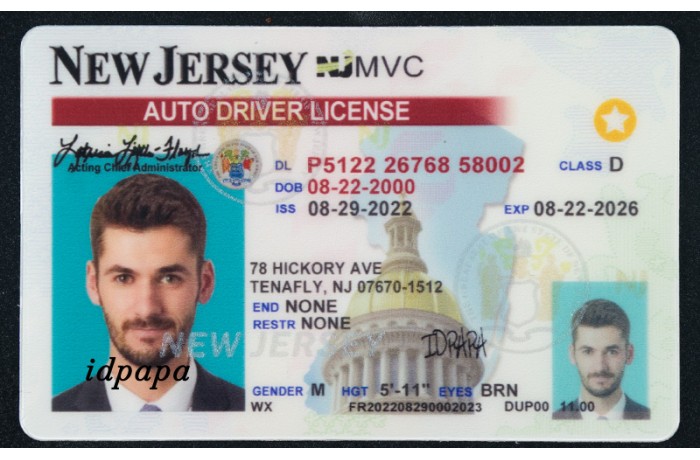
3. Bring a Chill Wingperson
If possible, go with someone who’s been to a few 21+ events. Having a friend who knows the ropes can make a massive difference on your first night out. They’ll know what to expect at the door, how to navigate a loud bar or club, and can help you ease into the environment without pressure. Their confidence can help calm your nerves and give you a point of stability when the noise, lights, or crowds feel a little too much. Plus, it’s always more fun to share those “first-time” moments with someone who gets it.
A calm, fun companion can help ease tension, break the ice with others, and make you feel less alone if things get overwhelming. Whether it’s introducing you to new people, helping with small talk, or laughing off awkward moments together, a good wingperson creates a buffer between you and the stress of a new setting. They're also great at picking up on social cues—knowing when to step in, when to step back, and how to keep the vibe relaxed without forcing anything. Think of them as your emotional support in a room full of strangers.
Another huge plus of having a wingperson is the safety factor. They’ll keep an eye out if you’re drinking, help steer you away from uncomfortable situations, and make sure you get home safely. It’s easy to feel overwhelmed or make poor decisions when you're out alone for the first time, but with a trusted friend by your side, you're more likely to stay grounded and enjoy the night with fewer worries.
Pro Move: Set up a buddy signal—like a hand gesture or code word—for when you need a breather. Whether it’s a subtle tap on the arm or a random word that means “let’s go outside for a minute,” having that non-verbal communication plan is a game changer. It allows you to quietly get the help or space you need without drawing attention. When you’re out in a loud or crowded space, even the most confident people need a moment to reset—and a good wingperson will always have your back.
4. Breathe, Don’t Overthink
First-time anxiety often stems from what-ifs:
“What if I don’t know anyone?”
“What if I mess up at the bar?”
“What if people notice I’m nervous?”
These thoughts loop in your mind and can easily spiral into self-doubt before you even walk through the door. But it’s important to recognize that these feelings are normal and experienced by almost everyone. The fear of not fitting in or doing something wrong can feel paralyzing, especially when it’s your first time in a 21+ environment. The trick is learning how to catch those anxious thoughts before they snowball.
Truth? Most people are focused on themselves. Everyone’s been the “new one” at some point. The seasoned regulars, the cool-looking groups, even the bartenders—they’ve all had their awkward firsts. No one is paying as much attention to you as you think they are. People are busy enjoying their night, dealing with their own insecurities, and catching up with friends. Reminding yourself of this simple truth helps shift your mindset from panic to perspective. The spotlight isn’t on you—so relax, breathe, and let yourself ease into the atmosphere.
If you feel a wave of panic, try this grounding trick:
5-4-3-2-1 — Name 5 things you can see, 4 you can touch, 3 you can hear, 2 you can smell, 1 you can taste. This sensory-based mindfulness exercise pulls your attention away from anxious thoughts and anchors you in the present. It works because it shifts your brain from “what if” thinking to “what is” awareness. Use it discreetly while you wait in line or at the bar, and you’ll find your nerves gradually fading as you regain control of your focus and energy.
5. Drink Smart, Not Fast
If you're drinking: start slow. The excitement of your first night out can make it tempting to jump right into rounds of shots or overly strong cocktails. But your body might not be used to alcohol, and getting buzzed too quickly can ruin the night. Start with one drink, sip it at your own pace, and give yourself time to feel how it affects you. The goal isn’t to get drunk—it’s to enjoy the experience without losing control. Drinking slowly helps you stay present, avoid embarrassing mistakes, and actually remember the night.
Know your limit. Everyone has a different tolerance, and just because your friends can down three tequila shots without blinking doesn’t mean you should. Pay attention to your body and your headspace. Signs that you’ve had enough include slurred speech, spinning rooms, or feeling overly emotional. Learning your limit comes with time, but the smartest thing you can do is stop before you hit it. A good night out is one where you stay safe, not one where you black out and wake up with regrets.
Stay hydrated. Alcohol dehydrates your body fast, and that can lead to headaches, dizziness, and worse hangovers. Alternate alcoholic drinks with water or soda, and you’ll last longer and feel better. Plus, having a water in hand is a great way to take a break from drinking without looking out of place. Hydration also helps you stay alert, make better decisions, and enjoy the night with a clearer head.
Never feel pressured to drink. Holding a soda or mocktail is just as social. You don’t need alcohol to be part of the scene. Confidence is the real buzz, and nothing says self-assured like someone who knows how to have fun on their own terms. Whether you're sipping a club soda with lime or just vibing to the music with your hands empty, owning your choice is what makes you stand out—in the best way. Drink if you want to, skip it if you don’t, and never apologize for doing what’s right for you.
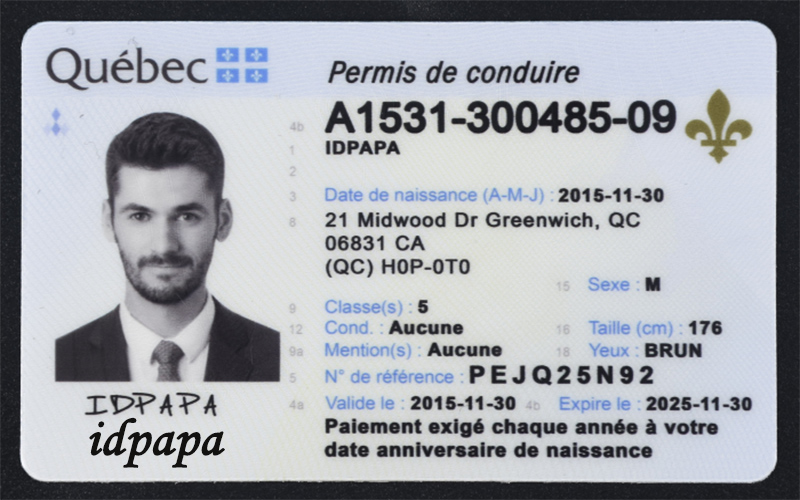
6. Plan Your Exit Strategy (Just in Case)
Knowing how you’ll get home gives you peace of mind. Whether it's a ride-share app, your own car, or a designated driver—lock it in before the party. One of the most stressful moments on a night out is realizing you're stranded or scrambling to find a ride at the last minute. Planning ahead eliminates that uncertainty and lets you enjoy the night without constantly checking the time or worrying about logistics. Even if you end up staying longer than expected, knowing you have a safe and reliable way home changes the entire vibe.
It’s also smart to communicate your plan to at least one person you trust—especially if you’re going out alone or using a fake ID. Let someone know where you’ll be and how you plan to get back. That kind of accountability adds a layer of safety and ensures someone can step in or check on you if needed. It’s not about being paranoid—it’s about being prepared. Whether you're walking, calling an Uber, or riding with a friend, make sure it's a plan you’re comfortable with and can access quickly if things go sideways.
Anxiety-Proof Tip: Have a “graceful exit” excuse ready if you feel overwhelmed. “I’ve got an early morning” always works. It’s a simple, non-confrontational way to bow out of a situation that no longer feels good—whether it’s social pressure, sensory overload, or just a bad vibe. Prepping that line in advance means you won’t freeze up trying to think of something in the moment. You don’t owe anyone a dramatic explanation. A short, polite excuse paired with a smile is all you need to leave the scene confidently and safely.
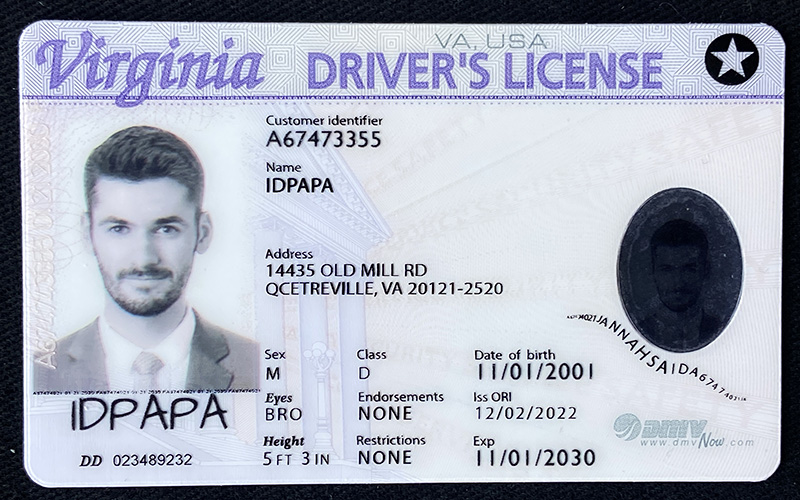
7. Embrace Awkward Moments
You might spill your drink. It happens to the best of us—whether it's a crowded bar, a shaky hand, or someone bumping into you unexpectedly. Don’t let it ruin your night. A quick apology, a chuckle, and a napkin can turn a clumsy moment into a shared laugh. Most people around you have done the exact same thing and won’t even think twice about it. Owning the moment with a smile shows maturity and keeps the vibe light.
You might forget someone’s name. Social settings are fast-paced, noisy, and filled with quick introductions that don’t always stick. If you can’t remember someone’s name five minutes after they tell you, just be honest and polite. A simple “Sorry, I totally missed your name—what was it again?” is way better than pretending or awkwardly avoiding conversation. People appreciate authenticity, and forgetting a name is one of the most normal social hiccups out there.
You might blank out during small talk. Maybe you can’t think of what to say next, or you suddenly realize you weren’t listening. That’s okay too. Smile, pivot the topic, or even say, “Sorry, I zoned out for a second—it’s been a long day.” Being human is relatable, and showing small imperfections actually makes others feel more comfortable around you. Conversations aren’t performances; they’re moments of connection. A little stumble doesn't break the flow—it just makes it real.
It's okay. Laugh it off. Being human is relatable—and honestly, a little awkwardness makes you memorable in the best way. The moments you think are embarrassing often end up being the stories you and your friends laugh about later. Embracing the awkward instead of fearing it helps you stay relaxed and open. People don’t connect with perfection—they connect with honesty, humor, and humility. So be yourself, slip-ups and all. That’s what makes the night truly fun.
8. Start Small, Stay Social
Not every 21+ event is a wild rave. There’s a huge range of adult social experiences out there, and diving headfirst into the most intense environments can be overwhelming—especially if it’s your first time out. You don’t have to start at the loudest club in town to feel like you’re participating in nightlife. In fact, some of the most enjoyable first experiences happen in quieter, more controlled settings where you can actually hear conversations and relax.
Start with low-key venues: wine tastings, chill birthday dinners, backyard barbecues, or small bar hangouts with friends. These environments give you the opportunity to get used to the social dynamics of 21+ settings without the pressure of strobe lights, packed dance floors, or shouting over music. You’ll still get to enjoy drinks, meet new people, and experience the vibe of being out—but in a way that feels approachable. These gatherings also give you the chance to observe how others carry themselves, order at the bar, and navigate the room, which is valuable when you’re learning the ropes.
Ease into the scene and build your social stamina. Just like anything else, getting comfortable in new social environments takes time. The more you put yourself in situations where you can practice, the more natural it all starts to feel. Think of it as building muscle memory for going out—you’ll gain confidence in how you dress, speak, move, and respond. Starting small sets a solid foundation for when you’re ready to take on larger events, making sure you’re not just surviving the night—but actually enjoying it.
9. Be Yourself (Yes, Seriously)
Trying to act “older” or “cooler” usually backfires. It might seem like the best way to fit in is to put on a confident, edgy persona—but that often comes off as forced or awkward. When you try too hard to match what you think people expect, you risk losing the natural vibe that makes you likable in the first place. People can usually tell when someone is pretending, and that energy tends to push others away rather than invite them in. Real confidence comes from comfort, not performance.
The people having the most fun are the ones who are real, relaxed, and unapologetically themselves. Whether they’re introverted and quietly enjoying a conversation in the corner or out on the dance floor singing every lyric to a throwback song, they’re not focused on looking “cool”—they’re just present. That kind of ease is magnetic. You don’t need to be the loudest or the trendiest person in the room to make a strong impression. Being grounded in who you are makes others feel comfortable around you, which is what creates good vibes.
Be the one who smiles first, says “hi,” or compliments someone’s outfit. People are drawn to authenticity. These small, genuine actions break the ice and make you more approachable. In an environment where a lot of people are trying to impress, being sincere stands out. You never know when a simple compliment or warm smile could spark a great conversation—or even a new friendship. The best version of you is the honest one, and when you let that shine, the night will feel less like a performance and more like a celebration of who you are.
10. Celebrate the Win
You made it through your first 21+ party! That alone is something to be proud of. Whether it was your first time navigating a bar, meeting new people in an unfamiliar setting, or just getting through the night without letting your nerves take over, it’s a milestone worth acknowledging. Not every step into adulthood feels monumental, but these little moments build your confidence and show you what you're capable of.
Even if you only stayed an hour or talked to a few people, that’s a win. It’s not about how long you lasted or how many numbers you got; it’s about taking the step and showing up. Every social experience helps you learn something new—about yourself, about others, or about the kind of energy you want to be around. The progress might feel small, but it’s real. You showed up, you pushed through, and you did more than you would have yesterday.
Each time gets easier. The first night might be filled with overthinking and second-guessing, but with every new outing, you’ll notice those thoughts quieting down. You’ll become more confident in how you dress, how you order, and how you move through the room. You'll pick up on the social cues, find your pace, and start enjoying the experience instead of just surviving it. You’ll gain a rhythm that feels more natural and less like you’re just trying to keep up.
The nerves fade. The confidence grows. You’ll soon find your rhythm, your people, and your favorite spots. That’s how it works. Every step forward brings you closer to feeling at home in this new social world. So give yourself credit. You did it. And the next time? It'll be even better.
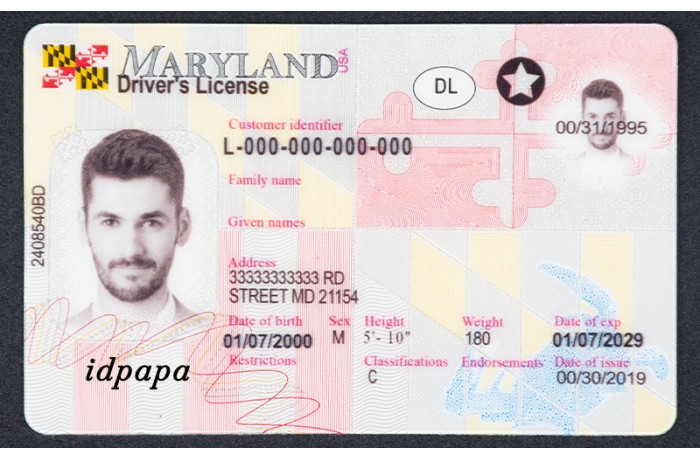
Final Thoughts:
First-time anxiety is a rite of passage. The trick isn’t to eliminate nerves—it’s to walk through them. The goal isn’t to be perfect—it’s to show up, be open, and enjoy the ride.
Ready to level up your social game? Start by embracing the jitters—and soon, you’ll be the one advising the next newcomer.

